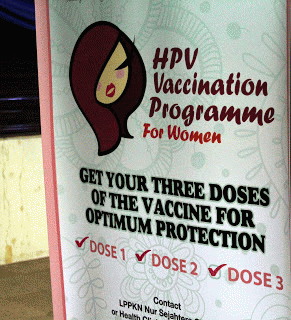
Screening for cervical and breast cancer can help save lives
(Image by CNS (Citizen News Service)) Details DMCA
Breast and cervical cancers are two major cancers among women. For decades, cervical cancer was the most common cancer in women in India. But now, breast cancer has replaced cervical cancer and become the leading cancer in terms of incidence and number of cancer deaths among women in India. The most common risk factors for breast cancer cited by Dr. Pooja Ramakant, Associate Professor, Department of Endocrine and Breast Surgery, Christian Medical College (CMC), Vellore, are: sedentary life style and lack of exercise; obesity; smoking; late age at first child birth; nulliparity; excess estrogen; early menarche and late menopause; not breast feeding; radiation hazards; junk food and at times genetic mutations which may run in the family.
There is no way we can prevent breast cancer, but with early detection, it can be treated adequately with the help of surgery, chemotherapy and radiotherapy. According to Dr. Rohini Khurana, Associate Professor, Department of Radiation Oncology at Dr. Ram Manohar Lohia Institute of Medical Sciences (RMLIMS), "All girls in schools and colleges should be taught to examine their own breasts and axilla on the tenth day after menstruation. If, on placing a flat palm, she feels any palpable lump, a doctor must be consulted immediately. As recommended by the American Cancer Society, after the age of 40, one mammographic examination should be done for every woman and it should be repeated yearly if any complications are detected."
Added Dr. Khurana: "Many a times, the entire breast is removed but in most cases, only the lump is extracted. If a patient is operated on time, the survival rate in the next five years can be as high as 77%, 51% and 5% at stages 1, 2/3 and 4 respectively. Breast cancer can be controlled during and after the treatment by following a healthy, nutritious diet and regular exercise."
Dr. Ramakant said that with early presentation, patients with malignant breast lump less than 1cm size may not even need chemotherapy. However, early detection is a problem. "Even when a woman feels a lump in her breast, she delays coming to a doctor, wasting time in seeking non-surgical methods while the lump keeps increasing and becoming more painful. By the time she finally sees a doctor the cancer is already locally advanced or metastatic and that adversely affects the prognosis and survival. The cost of treatment also goes up compared to early stage cancers", warned Dr. Ramakant.
No excuse for inaction: Cervical cancer is preventable!
Cervical cancer, though preventable, continues to be a major public health problem. Human papilloma virus (HPV) is necessary for the development of cervical cancer. Therefore, preventing HPV infection can prevent cervical cancer. A review of studies on dietary habits and incidence of cancers suggests that a diet high in carotenoids, fruits and vegetables and high intake of vitamins C and E reduces the risk of cervical cancer.
There is evidence that cervical cancer incidence is greater among women who are poor, less educated, and those with a larger number of children. Dr. Khurana enlightened on the various symptoms that may occur in the early stages of cervical cancer - like irregularity in the menstrual cycle, pain during intercourse or abnormal vaginal bleeding accompanied by a foul smell. "If any of these symptoms are being observed, the woman should immediately consult a gynecologist, said Dr. Khurana.
Pap smear test is a screening test for cervical cancer. However, a very small percentage of women undergo pap smear screening in our country due to lack of awareness. According to a study, less than 10% women in India access cervical cancer prevention services. VIA (visual inspection with acetic acid) popularly known as table vinegar - is another simple and low cost test to identify precancerous cervical lesions. It can be performed by a trained healthcare worker or a nurse. Abnormal screening test results mean more testing, sometimes including tests to see if a cancer or a pre-cancer is actually present or not. The tests that are used include colposcopy (with biopsy) and endocervical scraping. I recently spoke to 40 year old Rani (name changed) who had successfully battled cervical cancer. Although belonging to a small village, Rani was wise enough to rush to a local doctor without further delay when she noticed the first telltale symptoms. She had to change 3 hospitals before landing in a super-speciality hospital of Lucknow, where she was treated. She has since been on a plain and simple diet and takes her medicines regularly. With support from her family and doctors and with her self-determination Rani has maintained her hope and belief in life.
(Note: You can view every article as one long page if you sign up as an Advocate Member, or higher).





